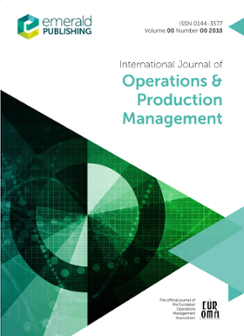Enhancing sustainable supply chain management performance through alliance portfolio diversity: the mediating effect of sustainability collaboration
IF 7.4
2区 管理学
Q1 MANAGEMENT
International Journal of Operations & Production Management
Pub Date : 2021-09-30
DOI:10.1108/ijopm-08-2020-0505
引用次数: 9
Abstract
PurposeWhile strategic alliances is a concept increasingly discussed in the field of sustainable supply chain management (SSCM), an emerging and more crucial concept regarding alliances—namely, the alliance portfolio—is mostly ignored in the SSCM context. Mainly drawing on the categorisation–elaboration model (CEM), this research develops a three-layer model to explore the effects of three alliance portfolio diversity facets on the three triple-bottom-line SSCM performances through the mediation of sustainability collaboration.Design/methodology/approachThe field data are collected from 321 Vietnamese manufacturers. Scale accuracy is assessed through the confirmatory factor analysis method. Hierarchical linear regressions are applied to test the proposed model and hypotheses.FindingsPartner, governance, and functional alliance portfolio diversities have a U-shaped, inverted U-shaped, and positive linear effect, respectively, on sustainability collaboration. Sustainability collaboration is in turn found to enhance the SSCM performances in terms of economic, environmental, and social.Originality/valueThis research introduced a new theoretical lens, CEM, to the SSCM field. It also provided findings that can help firms to manage their alliance portfolios more dynamically in terms of the nature and diversity level of the portfolio and in a way that adds to the triple bottom line through the mediating effect of sustainability collaboration.通过联盟组合多样性提高可持续供应链管理绩效:可持续合作的中介效应
目的虽然战略联盟是可持续供应链管理(SSCM)领域中越来越多讨论的一个概念,但在SSCM背景下,一个新兴的、更重要的联盟概念——即联盟组合——大多被忽视。本研究主要借鉴分类-细化模型(CEM),建立了一个三层模型,通过可持续合作的中介,探讨三个联盟投资组合多样性方面对三个三重底线SSCM绩效的影响。设计/方法/方法现场数据收集自321家越南制造商。量表的准确性通过验证性因素分析方法进行评估。应用层次线性回归对所提出的模型和假设进行了检验。FindingsPartner、治理和功能联盟投资组合的多样性对可持续性合作分别具有U型、倒U型和正线性效应。可持续性合作反过来被发现可以提高SSCM在经济、环境和社会方面的表现。原创性/价值本研究为SSCM领域引入了一种新的理论视角——CEM。它还提供了一些发现,可以帮助企业根据投资组合的性质和多样性水平更动态地管理其联盟投资组合,并通过可持续性合作的中介作用增加三重底线。
本文章由计算机程序翻译,如有差异,请以英文原文为准。
求助全文
约1分钟内获得全文
求助全文
来源期刊
CiteScore
13.30
自引率
17.20%
发文量
96
期刊介绍:
The mission of the International Journal of Operations & Production Management (IJOPM) is to publish cutting-edge, innovative research with the potential to significantly advance the field of Operations and Supply Chain Management, both in theory and practice. Drawing on experiences from manufacturing and service sectors, in both private and public contexts, the journal has earned widespread respect in this complex and increasingly vital area of business management.
Methodologically, IJOPM encompasses a broad spectrum of empirically-based inquiry using suitable research frameworks, as long as they offer generic insights of substantial value to operations and supply chain management. While the journal does not categorically exclude specific empirical methodologies, it does not accept purely mathematical modeling pieces. Regardless of the chosen mode of inquiry or methods employed, the key criteria are appropriateness of methodology, clarity in the study's execution, and rigor in the application of methods. It's important to note that any contribution should explicitly contribute to theory. The journal actively encourages the use of mixed methods where appropriate and valuable for generating research insights.

 求助内容:
求助内容: 应助结果提醒方式:
应助结果提醒方式:


